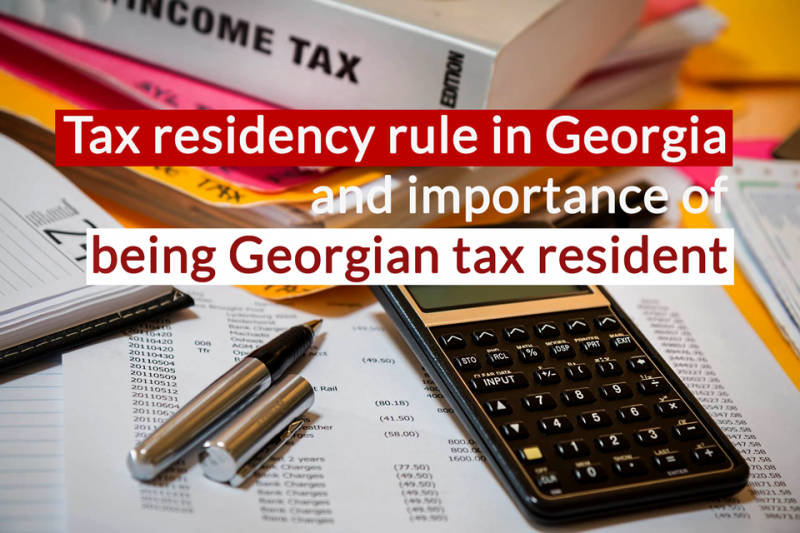Gela Barshovi is an international and Georgian tax consultant and founder of Tbilisi-based accounting/consulting firm TPsolution. Regarding business incorporation, tax consultation, and/or accounting services, you can directly reach out to him at gela.barshovi@tpsolution.ge
Changes in Georgian VAT rules
- მენეჯმენტი
- აგვისტო 22, 2020
- 10:12 am

About the Author: Gela Barshovi is an international and Georgian tax adviser with a decade of working experience in a field of taxation in Georgia and the EU. Gela manages a Tbilisi based audit and consulting firm TPsolution.
Introduction
From the 1st of January 2021, significant amendments of Georgian Value Added Tax (VAT) regulation will come into power. The Georgian parliament already approves the changes in the law. It is the most significant changes ever made in Georgian VAT regulation, and its purpose is to closer the rules with the VAT law applicable in the EU. In this article, I will generally describe amendments of one piece that might become the most important for Georgian resident persons providing services abroad (e.g., Georgian companies and natural persons, ex-pat entrepreneurs, freelancers).
The general principle of VAT taxation in Georgia
The Georgian VAT rate is 18%, and the registration threshold amounts 100 000 GEL. Reverse VAT is also 18% and is payable if a Georgian resident taxpayer receives service from non-resident persons (No threshold applies).
According to the Georgian tax code, only such delivery of services is taxable by VAT (or reverse VAT), which is considered provided in Georgian territory. Suppose a Georgian taxpayer provides service to abroad. In that case, that service will be exempt (with the right of VAT deduction) only if, according to the definition provided by the Georgian tax code, that service is qualified as delivered in the non-Georgian territory.
The same principle applies to the reverse VAT: When a non-resident provides service to Georgian resident taxpayer, and service is qualified as delivered outside of Georgian territory, no reverse VAT is applicable.
Therefore, every time the cross-border service provision occurs, we need to analyze whether the service was delivered in Georgian territory or not (thus, is taxable by VAT or not).
The current wording of the article “Place of service delivery” and its importance
There is a particular article #166 of Georgian tax code, dedicated to determining for VAT purposes whether the service was provided in Georgian territory or outside Georgia. That article consists of several paragraphs and subparagraphs among which the most widely used one is paragraph 1, subparagraph “d,” according to which:
“For this section, the place of service delivery shall be:
if the persons receiving and delivering services are in different states, the place of registration or management of the person receiving[1] Services or the location of the permanent establishment of the person receiving the services if the services are directly related to that permanent establishment. The provisions of this subparagraph shall apply to the following services:
d.a) the transfer of patents, licenses, trademarks, copyrights or other similar intangible assets;
d.b) delivery of consulting, legal, accounting, engineering, and other related services, also processing and delivery of data and information;
d.c) provision of personnel;
d.d) renting out the movable property, except for the renting of vehicles;
d.e) advertising services;
d.f) obligation to refrain from business activities or from exercising the right described in this subparagraph;
d.g) financial and insurance transactions, including reinsurance;
d.h) telecommunication, radio, and television broadcasting services;
d.i) electronically delivered services;
d.j) delivery of services through an intermediary, who acts in the name and on behalf of another person and takes part in the delivery of the services described in this paragraph.”
(Notably, Article 166.1. (d) applies ONLY to the type of services listed above)
What does this clause stand for?
A territory of the service is a jurisdiction wherever the service recipient is operating (registered or is managed from). If a Georgian tax resident provides service abroad, that service is considered as conducted outside of Georgian territory (Because the person who receives the services operates not in Georgia); therefore, that service is not taxable by VAT.
That principle is very similar to what is applicable in the EU and many other countries, but the problem is that the subparagraph mentioned above applies only to certain types of activities listed below this subparagraph. So, suppose the business activity (for example, agent service) is not in the list provided in the article #166.1 (d). In that case, we face opposite consequences: Provision of such service is most likely taxable by VAT when provided from Georgia to abroad and, on the contrary, exempt from reveres VAT if service recipient is a Georgian resident and provider is a non-resident person. The service would be exempted from VAT when provided from Georgia to abroad, only if it was listed in the mentioned sub-paragraph.
For example, the Georgian company provides a consultation service to a German company. That service will be exempt from Georgian VAT because consultation service is included in the list of services supplementing to the subparagraph “d” of article #166.1 for which the rule mentioned above applies.
Notably, the list of services is not exhaustive and leaves rooms for interpretations (e.g., “other similar services…). Besides, the legal definition of each type of activity to which the above-rule applies needs more in-depth analysis. For instance, for determining what is “advertisement service” which is listed in the paragraph, we need to check the legal definition of “advertisement” provided by the “Georgian law regarding the advertisement”. Lastly, in some cases, other subparagraphs of article #166 might be applicable rather than #166.1 (d), so, please be careful when analyzing this issue and do not read-only sub-paragraph “d” but read the whole article.
As we can see, as a result of the specificity of Georgian VAT rules, many taxpayers (e.g., ex-pats working from Georgia and providing service abroad) might face VAT taxation even if they invoice outside of Georgia. That is a big problem because the application of Value Added Tax increases service price by 18%, which cannot be deducted by the recipients as they are taxpayers in other jurisdictions.
The penalties for late VAT registration
If a person should register as a VAT payer but does not do it or does it later than the due time, the penalty 5% of turnover applies as well as interest 0.05% of the principal amount of due VAT each day until the actual payment of the tax liabilities is made to the budget.
What will change from 2021?
As already mentioned, the different rules of determining “the place of delivering the service” will be in force from January 2021. According to the new wording, the so-called “B to B” (Business to Business) and “B to C” (Business to Consumer) principle will apply. Let’s explain in more detail:
If a service is provided to a business, the place of service delivery is a place where the recipient operates (registration or management). Importantly, that rule is general and does not apply to only specific types of services differently from the current regulation. On the other hand, if the service is provided to a consumer, the place of service delivery is where the service provider operates (registration or management).
In other words, if Georgian taxpayer provides service to the non-resident taxpayer, it is not taxable by VAT in Georgia because it is B to B transaction, and the place of service delivery is not Georgia as the service recipient operates abroad.
As already mentioned, if a Georgian taxpayer provides service to foreign consumers, then the service might be taxable in Georgia because the B to C principle applies, and the service delivery is where the service provider operates (Georgia). However, the clause has its protection: in that case, some activities (mostly ones, given in the current subparagraph described above) such service is still exempt from VAT.
As you see, the new rule is more beneficial for Georgian residents providing service abroad but works on the contrary for the Georgian residents receiving service from abroad because from 2021 the later ones will have to levy reverse VAT on cross-border services more frequently than before (B to B, when recipient operates in Georgia).
Conclusion
Based on the current VAT rule, some type of services provided from Georgia to abroad is taxable by VAT because those services are considered as conducted on Georgian territory (because they are not in the list of services followed to a subparagraph #166.1 (d)). In the same way, reverse VAT is not payable to some services received by Georgian resident tax-layers from abroad. This rule will change from 2021, and according to the new wording, the most type of services provided from Georgia to abroad, will be exempt from VAT. Regardless of the original, more beneficial rule, each actual case still needs to be analyzed individually, case by case, with a qualified tax consultant to ensure that all liabilities are fulfilled correctly, and penalties are avoided.
—————————————————————————————————————————————————
[1] Here we find a mistake in the English version of the Georgian tax code published on www.matsne.gov.ge. It differs from the Georgian (prevailing) version (which is already corrected by me in the text). In particular, the word “delivering” is replaced by the word “receiving’’.
გააზიარე
ავტორის სხვა მასალა
- on თებერვალი 3, 2021
- on დეკემბერი 9, 2020
- on ოქტომბერი 8, 2020
- on აგვისტო 22, 2020







